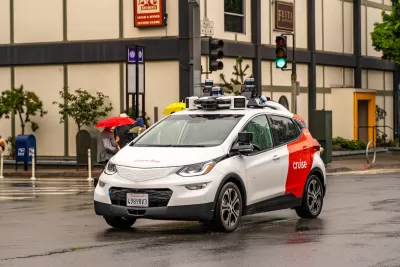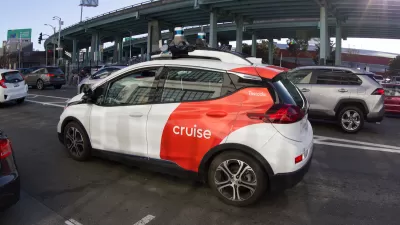The scrutiny facing the troubled self-driving car operator could have significant implications for the industry.

“General Motors' Cruise autonomous vehicle unit is recalling all 950 of its cars to update software after one of them dragged a pedestrian to the side of a San Francisco street in early October,” reports Tom Krisher in the Detroit Free Press.
The company suspended operations of its driverless vehicles after the October 2 crash. “Cruise says in documents posted by the U.S. National Highway Traffic Safety Administration that it already has updated software in test vehicles that are being supervised by human safety drivers. The driverless fleet will get the new software before resuming operations, the company says.” The company says it is adding a ‘chief safety officer’ and investing more in safety and transparency efforts.
The company was already under investigation for several other crashes that resulted in injuries to pedestrians. “Problems at Cruise could slow the deployment of fully autonomous vehicles that carry passengers without human drivers on board. It also could bring stronger federal regulation of the vehicles, which are carrying passengers in more cities nationwide.”
FULL STORY: General Motors recalls all Cruise autonomous vehicles after dragging a pedestrian

Rethinking Redlining
For decades we have blamed 100-year-old maps for the patterns of spatial racial inequity that persist in American cities today. An esteemed researcher says: we’ve got it all wrong.

Planetizen Federal Action Tracker
A weekly monitor of how Trump’s orders and actions are impacting planners and planning in America.

Montreal Mall to Become 6,000 Housing Units
Place Versailles will be transformed into a mixed-use complex over the next 25 years.

Santa Clara County Dedicates Over $28M to Affordable Housing
The county is funding over 600 new affordable housing units via revenue from a 2016 bond measure.

Why a Failed ‘Smart City’ Is Still Relevant
A Google-backed proposal to turn an underused section of Toronto waterfront into a tech hub holds relevant lessons about privacy and data.

When Sears Pioneered Modular Housing
Kit homes sold in catalogs like Sears and Montgomery Ward made homeownership affordable for midcentury Americans.
Urban Design for Planners 1: Software Tools
This six-course series explores essential urban design concepts using open source software and equips planners with the tools they need to participate fully in the urban design process.
Planning for Universal Design
Learn the tools for implementing Universal Design in planning regulations.
City of Camden Redevelopment Agency
City of Astoria
Transportation Research & Education Center (TREC) at Portland State University
Regional Transportation Commission of Southern Nevada
Toledo-Lucas County Plan Commissions





























